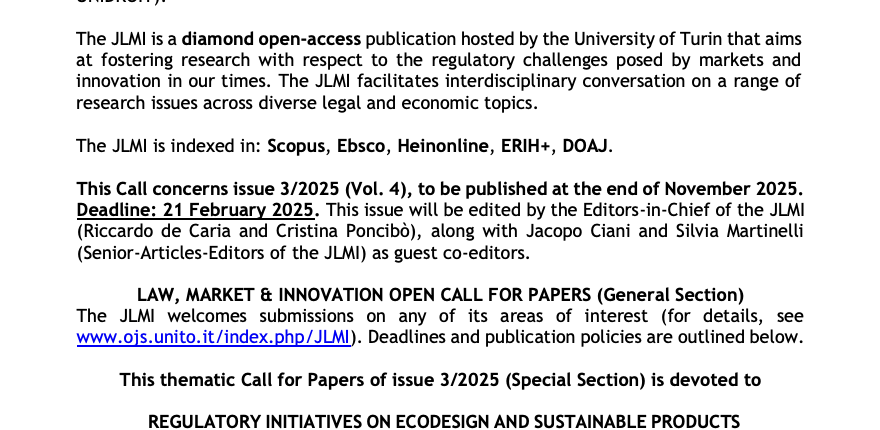This is a password protected post.
Call for papers – Issue no. 3/2025. Journal of Law, Market & Innovation

This Call for Papers of the Journal of Law, Market & Innovation (JLMI) concerns the third issue to be published at the end of July 2025 and is devoted to Regulatory Initiatives on Ecodesign and Sustainable Products. This issue will be edited by the Editors-in-Chief of the JLMI (Riccardo de Caria and Cristina Poncibò), along with Jacopo Ciani and Silvia Martinelli (Senior-Articles-Editors of the JLMI) as guest co-editor. You can find the call with all the details at the following link:
Regulatory Initiatives on Ecodesign and Sustainable Products
The Call invites contributions on the subject of “Regulatory Initiatives on Ecodesign and Sustainable Products”, to explore the legal frameworks, challenges, and opportunities related to ecodesign, with the goal of fostering an in-depth understanding of how it can influence economic growth and how it will be integrated in the current legal framework. This Special Section invites scholarly contributions examining the role of emerging sustainability initiatives, introducing new sustainability requirements and responsibilities, particularly in the EU regulatory framework.
The concept of ecodesign is defined by Regulation 1781/2024 as “the integration of environmental sustainability considerations into the characteristics of a product and the processes taking place throughout the product’s value chain”.
Regulation 1781/2024 is one of the pillars of the new European legislation to improve the sustainability of the economy and is part of the EU Strategy for sustainable products. It includes product policy principles and provides a Digital Product Passport, performance and information requirements, producer responsibility for sustainability with impact assessment, mandatory sustainability labelling and technical standards for sustainability. It complements the Corporate Sustainability Reporting Directive (CSRD) and the Corporate Sustainability Due Diligence Directive (CSDDD), which impose transparency and due diligence obligations on corporate activities.
We welcome original articles that provide insights into the legal dimensions of ecodesign and explore, but are not limited to, the following topics:
- Contracts and Ecodesign: how ecodesign interferes with the creation and supply of products and regulatory challenges connected to this transformation.
- Legal Design and Legal Tech: analysis of the new Digital Product Passport and its role in the governance of information duties and supply chains.
- Sustainable Supply Chains and Global Trade: legal challenges in ensuring that ecodesign principles are upheld throughout global supply chains, particularly in light of international trade laws and cross-border environmental regulations.
- Product Liability and Environmental Impact: legal perspectives on product liability in the context of ecodesign, focusing on the implications of design decisions that determine a product’s environmental impact.
- Consumer Protection and Ecodesign: balance between consumer rights, safety, and environmental responsibility. How consumer protection laws can be adapted to support sustainable product design while ensuring consumer interests are met and the role played by extended producer liability.
- Intellectual Property and Ecodesign: how intellectual property law (patents, trademarks, and design rights) intersects with ecodesign. Considerations for protecting eco-friendly innovations and the challenges faced by businesses in this domain.
- Corporate Responsibility and Accountability: legal expectations for corporations in adhering to environmental standards and sustainable practices. An examination of laws regulating corporate reporting on environmental performance and the role of ecodesign in meeting Corporate Social Responsibility (CSR) obligations.
- Case Studies: analysis of legal precedents, case studies, or legal battles related to ecodesign, illustrating how legal frameworks have been applied or challenged in the context of sustainable product design.
We welcome theoretical, empirical, and case-based approaches that provide a deeper understanding of ecodesign, its practical applications, its challenges and consequences for the economy and its implications within the current regulatory framework. The Editorial Board will select articles based on the quality of research and writing, diversity, and relevance of topic. The novelty of the academic contribution is also an essential requirement.
Prospective articles should be submitted in the form of abstracts (around 800 words) or draft articles (see below) to submissions.jlmi@iuse.it by 21 February 2025. Authors will be notified of the outcome of their submission by 3 March 2025. Final articles shall be delivered by 3 June 2025 and should conform to the journal style guide that is based on OSCOLA.
Typically, the JLMI accepts contributions within the range of 10.000-15.000 words, including footnotes, but both shorter and longer articles will be considered. Submitted articles will undergo a rigorous double-blind peer-review process. Prior to submission, prospective authors are invited to check the JLMI Authors’ guidelines (also with regard to simultaneous submission to other journals) and Code of Ethics. For further information, or consultation on a potential submission, please email us at editors.jlmi@iuse.it.
Authors are required to disclose if they have submitted their article elsewhere, both in case of negative and pending reviews, and promptly update the editorial board of any changes in this regard, throughout the whole editorial process with the JLMI.
For more informations:








